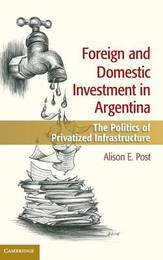
|
Foreign and Domestic Investment in Argentina: The Politics of Privatized Infrastructure
Hardback
Main Details
| Title |
Foreign and Domestic Investment in Argentina: The Politics of Privatized Infrastructure
|
| Authors and Contributors |
By (author) Alison E. Post
|
| Physical Properties |
| Format:Hardback | | Pages:266 | | Dimensions(mm): Height 236,Width 160 |
|
| Category/Genre | Development economics
Political economy |
|---|
| ISBN/Barcode |
9781107048041
|
| Classifications | Dewey:338.982 |
|---|
| Audience | | Professional & Vocational | |
|---|
| Illustrations |
30 Tables, unspecified; 1 Maps; 4 Line drawings, black and white
|
|
Publishing Details |
| Publisher |
Cambridge University Press
|
| Imprint |
Cambridge University Press
|
| Publication Date |
17 April 2014 |
| Publication Country |
United Kingdom
|
Description
Political economy scholarship suggests that private sector investment, and thus economic growth, is more likely to occur when formal institutions allow states to provide investors with credible commitments to protect property rights. This book argues that this maxim does not hold for infrastructure privatization programs. Rather, differences in firm organizational structure better explain the viability of privatization contracts in weak institutional environments. Domestic investors - or, if contracts are granted subnationally, domestic investors with diverse holdings in their contract jurisdiction - work most effectively in the volatile economic and political environments of the developing world. They are able to negotiate mutually beneficial adaptations to their contracts with host governments because cross-sector diversification provides them with informal contractual supports. The book finds strong empirical support for this argument through an analysis of fourteen water and sanitation privatization contracts in Argentina and a statistical analysis of sector trends in developing countries.
Author Biography
Alison E. Post is Assistant Professor of Political Science and Global Metropolitan Studies at the University of California, Berkeley. Prior to joining the Berkeley faculty, she was a Postdoctoral Fellow with the Committee on Global Thought at Columbia University, a Visiting Researcher at the Centro de Estudios de Estado y Sociedad in Buenos Aires and the UN Economic Commission for Latin America and the Caribbean in Santiago, and a Researcher at the London School of Urban Research in London. Her doctoral dissertation won the 2009 William Anderson award from the American Political Science Association for the best dissertation in the general field of federalism, intergovernmental relations, state or local politics.
Reviews'Post's book is must-reading for anyone interested in the private provision of infrastructure services, and particularly the epidemic of cancelled concession contracts. The existing literature emphasizes the role of institutional features - such as international legal guarantees, independent regulators, and other formal property rights protections - in discouraging cancellation. But Post's in-depth study of 14 water concessions in Argentina suggests that informal property rights protections are more important. In particular, concessions led by domestic firms with diversified local holdings are much more resilient than those led by multi-national companies specializing in infrastructure because the domestic companies are more socially and politically embedded and have a wider variety of negotiating options.' Jose A. Gomez-Ibanez, Derek C. Bok Professor of Urban Planning and Public Policy, Harvard University, Massachusetts 'Development studies has recently turned its attention to the legal environment facing business. Does greater accountability of government improve the rule of law and thus spur economic activity? Alison E. Post reminds us that firms play an important role in this process: that domestic firms with diverse local connections will have greater influence over regulation than foreign investors. It's refreshing to see such a sharp-eyed study that takes us back to the basics of political economy and has wide implications for the study of both privatization and foreign investment.' Stephan M. Haggard, University of California, San Diego 'What explains variation in the sustainability of private investments in politically volatile environments? This groundbreaking book addresses the question by illuminating the informal mechanisms that protect investors in the absence of formal legal safeguards in developing countries. Building on Vernon's analysis of the 'obsolescing bargaining' and Williamson's notion of 'relational contracting,' Alison E. Post not only documents but explains the conditions that make private investment more (or at times less) resilient to regulatory capture in the water and sanitation sectors. Her insightful contributions improve our understanding of the political conditions that shape the definition of property rights, while pointing to the vulnerability of institutions and treaties that require third-party enforcement. This book is a must-read for any scholar of economic development and comparative political economy more generally.' M. Victoria Murillo, Columbia University, New York 'Alison E. Post's insightful new book will shake up much received wisdom on the political economy of regulation and on property rights and firm strategies more generally. Strict property rights, backed up by powerful courts, are not the godsend they are presumed to be; they turn out, Post shows, to be brittle and ineffective. Moreover, diversified business groups, long thought to be waning vestiges of traditional capitalism, are in fact more flexible and committed partners in ongoing negotiations over inevitably evolving regulation. The exacting empirical research unveils the full complexities of Argentine politics but at the same time has broad implications for theorizing on firms, property rights, and regulation.' Ben Ross Schneider, Massachusetts Institute of Technology
|